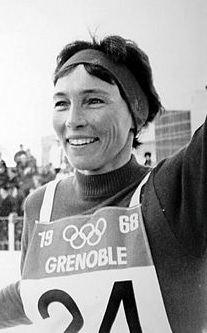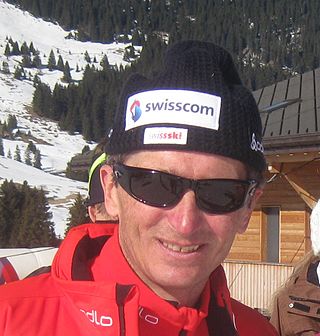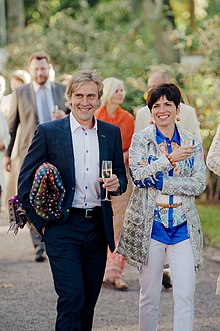
The 1948 Winter Olympics, officially known as the V Olympic Winter Games and commonly known as St. Moritz 1948, were a winter multi-sport event held from 30 January to 8 February 1948 in St. Moritz, Switzerland. The Games were the first to be celebrated after World War II; it had been twelve years since the last Winter Games in 1936.

The 1928 Winter Olympics, officially known as the II Olympic Winter Games and commonly known as St. Moritz 1928, were an international winter multi-sport event that was celebrated from 11 to 19 February 1928 in St. Moritz, Switzerland.

The 1924 Winter Olympics, officially known as the I Olympic Winter Games and commonly known as Chamonix 1924, were a winter multi-sport event which was held in 1924 in Chamonix, France. Originally held in association with the 1924 Summer Olympics, the sports competitions were held at the foot of Mont Blanc in Chamonix, and Haute-Savoie, France between 25 January and 5 February 1924. The Games were organized by the French Olympic Committee, and were originally reckoned as the "International Winter Sports Week." With the success of the event, it was retroactively designated by the International Olympic Committee (IOC) as "the first Olympic Winter Games".

The 1994 Winter Olympics, officially known as the XVII Olympic Winter Games and commonly known as Lillehammer '94, was an international winter multi-sport event held from 12 to 27 February 1994 in and around Lillehammer, Norway. Having lost the bid for the 1992 Winter Olympics to Albertville in France, Lillehammer was awarded the 1994 Winter Games on 15 September 1988, two days before the 1988 Summer Olympics opening ceremonies at the 94th IOC Session in Seoul, South Korea. Due to the calendar changes made in 1985, this was the only time that the Winter Olympics took place two years after the previous Winter Games, and the first to be held in a different year from the Summer Olympics. This was the second Olympic Games of any type hosted in Norway — the first being the 1952 Winter Olympics in Oslo — and the fourth Olympics overall to be held in a Nordic country, after the 1912 Summer Olympics in Stockholm, Sweden, and the 1952 Summer Olympics in Helsinki, Finland. As of 2022, Lillehammer is the northernmost city ever to host the Olympic Games and also the smallest. This was the last of three consecutive Olympics held in Europe, with Albertville and Barcelona in Spain hosting the 1992 Winter and Summer Games, respectively.

The 1984 Winter Olympics, officially known as the XIV Olympic Winter Games and commonly known as Sarajevo '84, were a winter multi-sport event held between 8 and 19 February 1984 in Sarajevo, Yugoslavia. It was the first Winter Olympic Games held in a Slavic language-speaking country, as well as the only Winter Olympics held in a communist country before the 2022 Winter Olympics in Beijing, China. It was the second consecutive Olympic Games held in a communist country, after the 1980 Summer Olympics in Moscow, Russian SFSR, Soviet Union.

The 1952 Winter Olympics, officially known as the VI Olympic Winter Games and commonly known as Oslo 1952, was a winter multi-sport event held from 14 to 25 February 1952 in Oslo, the capital of Norway.

The 1960 Winter Olympics were a winter multi-sport event held from February 18 to 28, 1960, at the Squaw Valley Resort in Squaw Valley, California, United States. The resort was chosen to host the Games at the 1956 meeting of the International Olympic Committee (IOC). Squaw Valley was an undeveloped resort in 1955, so the infrastructure and all of the venues were built between 1956 and 1960 at a cost of US$80,000,000. The layout was designed to be intimate, allowing spectators and competitors to reach most of the venues on foot.

The 1956 Winter Olympics, officially known as the VII Olympic Winter Games and commonly known as Cortina d'Ampezzo 1956, was a multi-sport event held in Cortina d'Ampezzo, Italy, from 26 January to 5 February 1956.
The 1988 Winter Olympics, officially known as the XV Olympic Winter Games, was a winter multi-sport event held in Calgary, Canada, from 13 to 28 February 1988. A total of 1,423 athletes representing 57 National Olympic Committees (NOCs) participated in 46 events from 10 different sports and disciplines. Five new events were contested at these Games—men's and women's Super G in alpine skiing, team events in Nordic combined and ski jumping, and women's 5000 metres in speed skating—and two events returned to the program—men's and women's combined in alpine skiing.

Anna Levandi, née Kondrashova, is an Estonian former competitive figure skater of Russian origin who represented the former Soviet Union in international competition. She was the 1984 World silver medalist and four-time European bronze medalist. She competed at two Winter Olympic Games.

Alevtina Pavlovna Kolchina was a Soviet cross-country skier who competed during the 1950s and 1960s for Burevestnik and later for Dynamo sports societies. She competed in four Winter Olympics, earning a total of five medals. Kolchina also competed several times at the Holmenkollen ski festival, winning three times at 10 km (1961–1963) and once at 5 km (1966).
Günther Csar is a former Austrian nordic combined skier who competed during the late 1980s and early 1990s. He won a bronze medal in the 3 x 10 km team event at the 1988 Winter Olympics in Calgary and also won a gold medal in the 3 x 10 km team event at the 1991 FIS Nordic World Ski Championships in Val di Fiemme.

Hippolyt Kempf is a Swiss Nordic combined skier who competed during the late 1980s and early 1990s.
Yevgeny Prokopievich Belyayev was a Soviet/Russian cross-country skier who competed in the 1970s and 1980s, representing the Soviet Union at the international level. Belyayev trained at VSS Trud in Leningrad until 1981 and at Dynamo in the same city since then. He won the 15 km silver and the 4 × 10 km relay bronze at the 1976 Winter Olympics in Innsbruck, then followed it with a 4 × 10 km relay gold at the 1980 Winter Olympics in Lake Placid, New York.

Vasily Pavlovich Rochev is a former Soviet/Russian cross-country skier who competed in the 1970s and early 1980s, training at Dynamo in Syktyvkar. He won two medals for the Soviet Union at the 1980 Winter Olympics in Lake Placid, New York, with a gold in the 4 × 10 km relay and a silver in the 30 km.

Finland first participated at the Olympic Games in 1908, and has sent athletes to compete in every Summer Olympic Games and every Winter Olympic Games since then. Finland was also the host nation for the 1952 Summer Olympics in Helsinki. Finnish athletes have won a total of 305 medals at the Summer Games, mostly in athletics and wrestling. Finland has also won 175 medals at the Winter Games, mostly in nordic skiing events.

Estonia first competed as a nation at the 1920 Summer Olympics, two years after the country declared independence from the then warring Russian and German Empires in 1918. The Estonian National Olympic Committee was established in 1923. The first Winter Olympics for independent Estonia were the 1928 Winter Olympics. Estonian athletes took part in the Olympic Games until the country was invaded and occupied by the Soviet Union in 1940. The 1980 Summer Olympics sailing regatta was held in Tallinn, Soviet-occupied Estonia. Since the end of the Soviet occupation in 1991, Estonia has participated in all Olympics. Estonia has won most of its medals in wrestling (11), weightlifting (7), cross-country skiing (7) and athletics (6).
Levandi is an Estonian surname. Notable people with the surname include:

Arlet Levandi is an Estonian figure skater. He is the 2022 Tallink Hotels Cup champion and a two-time Estonian national silver medalist. At the junior level, he is the 2022 European Youth Olympic Festival champion, the 2021 JGP France II silver medalist, the 2021 JGP Slovenia silver medalist, and a 2020 Winter Youth Olympic champion in the team event. Levandi is the first men's singles skater from Estonia to win a Junior Grand Prix medal.
















